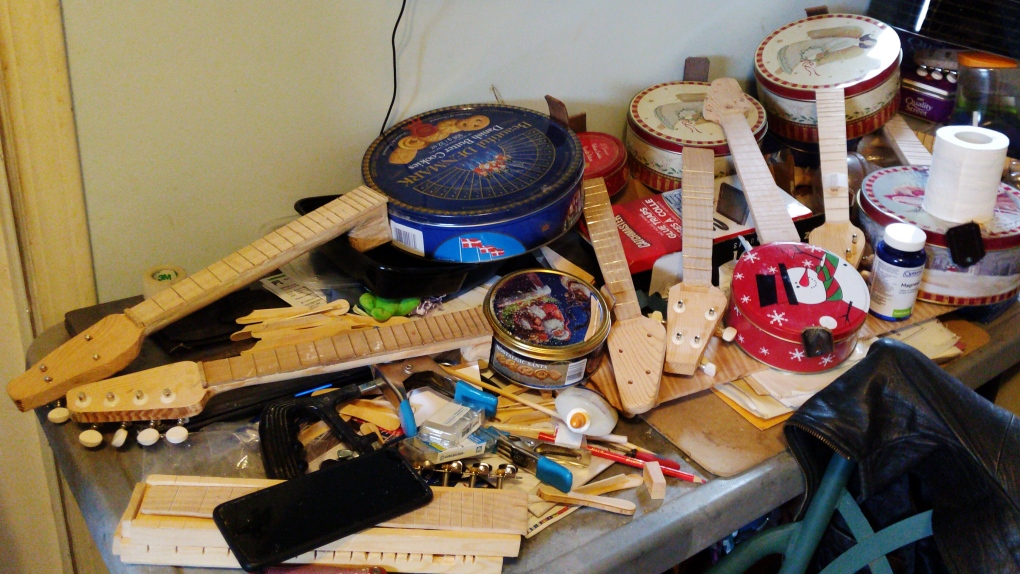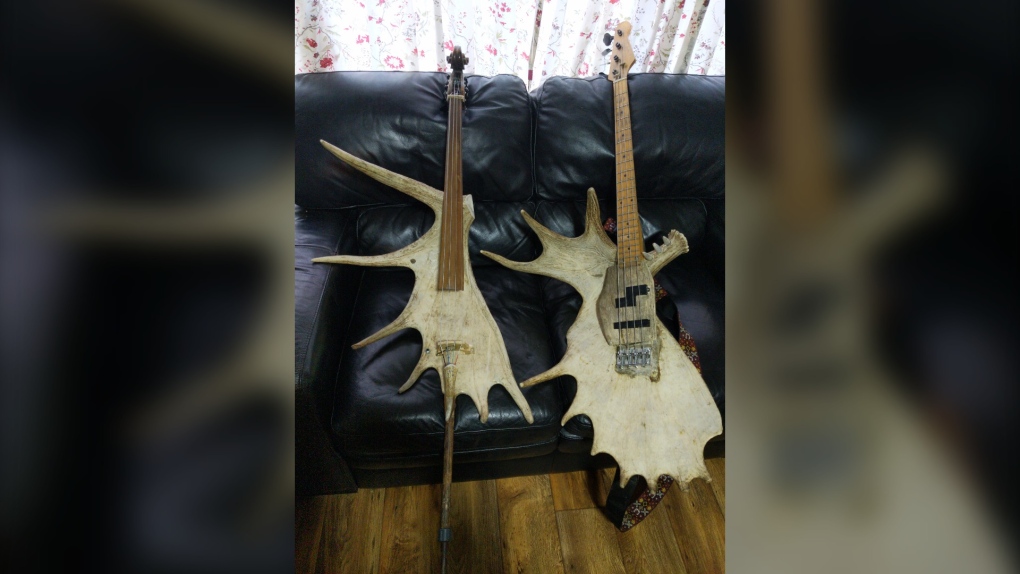Manitoba man hopes to sell parts of unique, homemade musical instrument collection
Eighty-eight-year-old Lorne Collie has been making musical instruments for more than three decades, creations that dazzle for their unique materials as much as their sound.
There’s a hefty bass guitar and a cello made of moose antlers, a baseball bat violin, ukuleles made of cookie tins, and guitars fashioned from pitch forks, a shovel, and a rake.
His personal favourites? A frying pan mandolin and a banjo made of a motorcycle tire rim, covered by stretched deerskin painted by his late wife.
 Instruments made by Lorne Collie out of cookie tins are shown at his son’s home in Hope, B.C. in this undated handout photo. (Submitted by James Collie to The Canadian Press)
Instruments made by Lorne Collie out of cookie tins are shown at his son’s home in Hope, B.C. in this undated handout photo. (Submitted by James Collie to The Canadian Press)
“When people wanted to buy them, I always said No,” Collie said from his home outside the tiny and remote Manitoba community of Hilbre, about 230 kilometres northwest of Winnipeg.
“I wasn’t hurting for money, but what I was afraid of is that if I started selling them, I would be working myself to death to try to keep up to the orders.”
Collie said he once turned down an offer of $35,000 for a moose antler electric guitar.
Now things have changed.
“That was the policy back then,” he said. “I’m 88 now and not as spry and lively as I used to be.”
With the help of his son James who lives in Hope, B.C., Collie is hoping to sell some of his collection. The electric bass guitar is on sale for $8,000, and the cello for $6,500.
Collie said he needs the funds to upgrade his older model electric car to one with better range and speed, so he can see his large family.
“I would like to and I do quite a bit of travelling. My wife has passed on and I’m alone. I’ve got 25 great grandchildren and they’re all in Alberta and B.C.,” Collie said. “I’ve got lots of reasons to drive.”
Collie said he first put the antler instruments up for sale this summer, but while there were a few inquiries from Vancouver “nobody came out to see them.”
“You really have to see them to appreciate them,” he said.
 A cello, left, and a bass guitar made by Lorne Collie out of moose antlers are shown at his son’s home in Hope, B.C. in this undated handout photo. (Submitted by James Collie to The Canadian Press)
A cello, left, and a bass guitar made by Lorne Collie out of moose antlers are shown at his son’s home in Hope, B.C. in this undated handout photo. (Submitted by James Collie to The Canadian Press)
Collie’s instrument building began with a near-death experience that forced him to retire from his trade as a machinist.
He said he was “working tremendous, long hours at a high stress” job in the late 1980s, when he collapsed with a brain aneurysm that put him in a coma for more than a week.
“That was supposed to have killed me,” he said. “They wrote me off as dead.”
Collie said he woke up with a clear head, and after a friend challenged him to “put strings on a shovel,” he began making instruments from other odd, kitschy implements.
He said he walked into his workshop one day, saw a broken guitar on a workbench and a moose antler on another and “got the idea of putting them together.”
Friends on a nearby First Nations reserve and a brother-in-law who maintains a trapline found the antlers and gave them to him.
The first antler instrument, a guitar, “turned out very, very good.”
The antler doesn’t warp and it’s very strong, Collie said, adding that he’s had success with most materials, other than an ill-fated attempt at making a lap steel guitar from a snowshoe.
The moose antler bass guitar weighs nearly eight kilograms, he said, but it’s “one of the most comfortable” instruments he’s made.
“And it sounds good, just like a good solid-body electric guitar,” Collie said.
Collie isn’t done yet with his unique instruments. He said he also wants to make a Celtic harp, but he needs “fairly large antler with quite a deep curve in it.”
“I’m not much of a musician,” he said. “I can play any of them good enough to know if they’re working, but I’m not a performer.”
He likes the idea of a group of musicians getting together to do a “talent show” with his creations, but if he can sell the antler bass and cello, he’d be happy “just to know they’re being enjoyed.”
“I’ve been making stuff my entire life,” he said. “I was born for making things, that’s for sure.”
This report by The Canadian Press was first published Dec. 21, 2024.
View original article here Source









